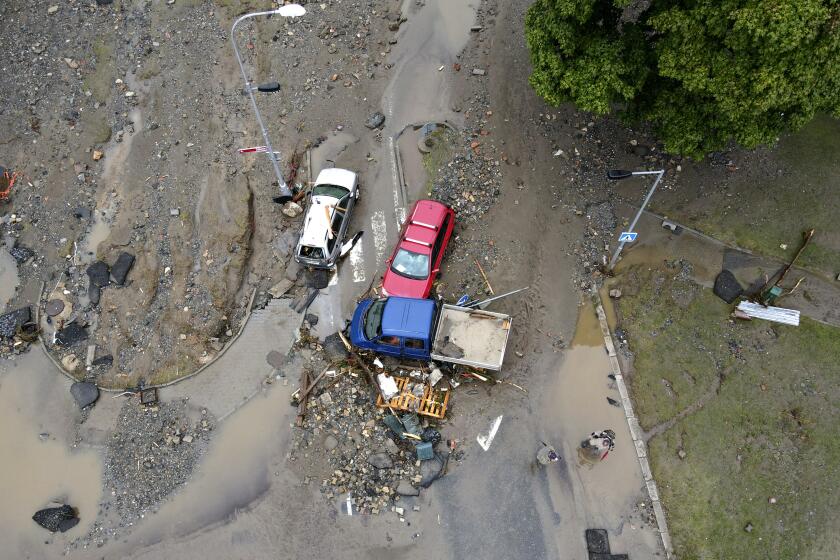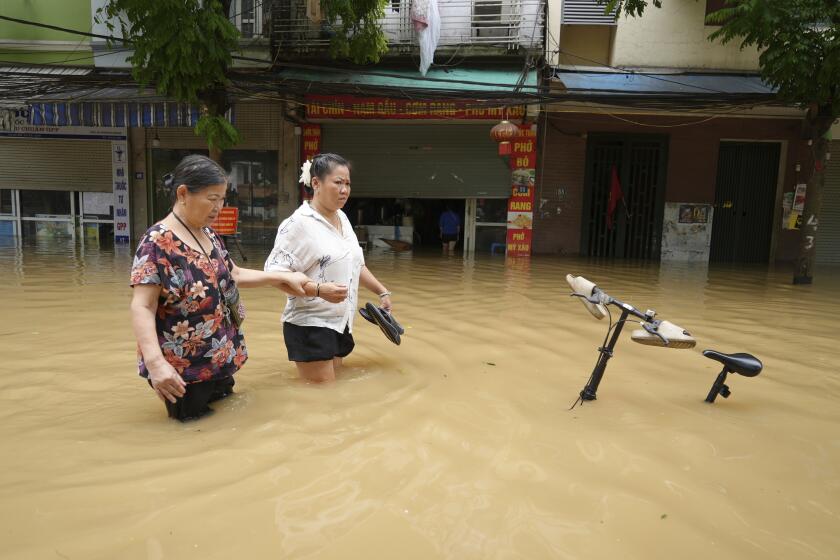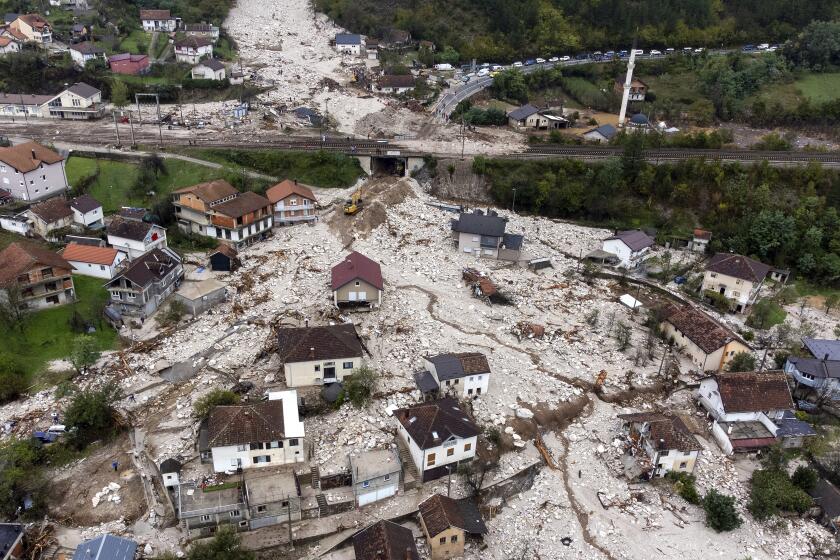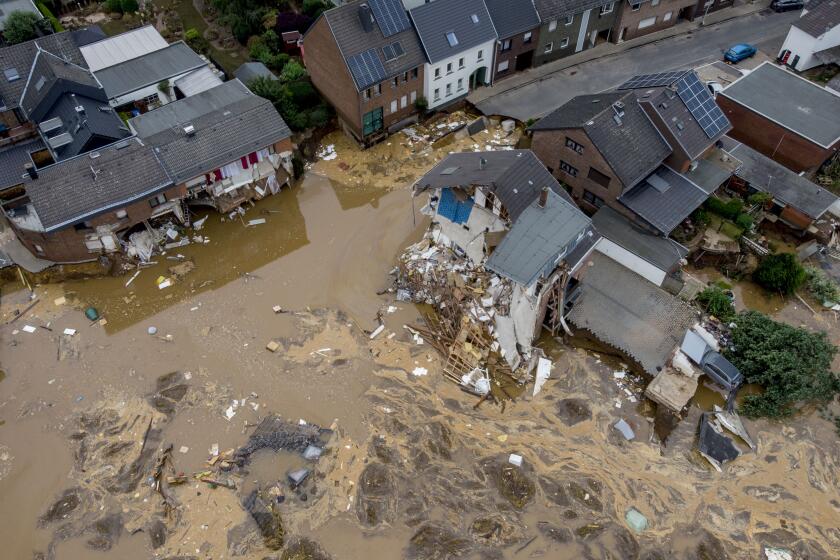At least 95 people die in devastating flash floods in Spain

UTIEL, Spain — Flash floods in Spain turned village streets into rivers, ruined homes, disrupted transportation and killed at least 95 people in the worst natural disaster to hit the European nation in recent memory.
Rainstorms that started Tuesday and continued Wednesday caused flooding across southern and eastern Spain, stretching from Malaga to Valencia. Muddy torrents tumbled vehicles down streets at high speeds while debris and household items swirled in the water. Police and rescue services used helicopters to lift people from their homes and rubber boats to reach drivers stranded atop cars.
Emergency services in the eastern region of Valencia confirmed a death toll of 92 people on Wednesday. Two additional casualties were reported in the neighboring Castilla La Mancha region, while southern Andalusia reported one death.
“Yesterday was the worst day of my life,” Ricardo Gabaldón, the mayor of Utiel, a town in Valencia, told national broadcaster RTVE on Wednesday. He said six residents perished and more are missing.
A massive flood wave moving across Central Europe is threatening new areas and raising concerns among residents and officials.
“We were trapped like rats. Cars and trash containers were flowing down the streets. The water was rising” to nearly 10 feet, he said.
Spain’s government declared three days of mourning starting Thursday.
“For those who are looking for their loved ones, all of Spain feels your pain,” Prime Minister Pedro Sánchez said in a televised address.
Rescue personnel and more than 1,100 soldiers from Spain’s emergency response units were deployed to affected areas. The central government set up a crisis committee to coordinate rescue efforts.
Javier Berenguer, 63, escaped his bakery in Utiel when crushing water threatened to overwhelm him. He said it rose to 8.2 feet inside his business, and he fears his livelihood has been destroyed.
“I had to get out of a window as best I could because the water was already coming up to my shoulders. I took refuge on the first floor with the neighbors and I stayed there all night,” Berenguer told the Associated Press. “It has taken everything. I have to throw everything out of the bakery — the freezers, ovens, everything.”
A low-pressure system crossing the region has unleashed record-high rains for days and was expected to affect Slovakia and Hungary later in the week.
María Carmen Martínez, another Utiel resident, witnessed a harrowing rescue.
“It was horrible, horrible. There was a man there clinging to a fence who was falling and calling people for help,” she said. “They couldn’t help him until the helicopters came and took him away.”
One Valencia town, Paiporta, suffered exceptional loss. Mayor Maribel Albalat told RTVE that more than 30 people died in the town of about 25,000 people. Those included six residents of a senior home. News media broadcast video of elderly people in chairs and wheelchairs at a Paiporta nursing home, some crying out in terror as the water rose over their knees.
“We don’t know what happened, but in 10 minutes the village was overflowing with water,” Albalat said.
Spain’s national weather service said it rained more in eight hours in Valencia than it had in the preceding 20 months, calling the deluge “extraordinary.”
Nearly 200 people have died in Vietnam in the aftermath of Typhoon Yagi and 128 are missing as flash floods and landslides take their toll.
Located south of Barcelona on the Mediterranean coast, Valencia is a tourist destination known for its beaches and citrus orchards, and as the origin of the rice dish, paella. The region has gorges and small riverbeds that spend much of the year completely dry but quickly fill with water when it rains. Many of them pass through populated areas.
As the floods receded, thick layers of mud mixed with refuse made some streets unrecognizable.
“The neighborhood is destroyed, all the cars are on top of each other, it’s literally smashed up,” Christian Viena, a bar owner in the Valencian village of Barrio de la Torre, said by phone. “Everything is a total wreck, everything is ready to be thrown away. The mud is almost [a foot] deep.”
Outside Viena’s bar, people were venturing out to see what they could salvage. Cars were piled up on streets.
Spain has experienced similar autumn storms in recent years. Nothing, however, compared with the devastation over the last two days, which recalls floods in Germany and Belgium in 2021 in which 230 people were killed.
Bosnia sought EU help after a heavy rainstorm left entire areas under water and debris destroyed roads and bridges, killing at least 18 people.
The death toll will probably rise with other regions yet to report victims and search efforts continuing in hard-to-reach places.
“We are facing a very difficult situation,” said Ángel Víctor Torres, the minister of territory policies. “The fact that we can’t give a number of the missing persons indicates the magnitude of the tragedy.”
Spain is still recovering from a severe drought and has registered record high temperatures in recent years. Scientists say increased episodes of extreme weather are likely probably to climate change. The prolonged drought makes it more difficult for the land to absorb high volumes of water.
The storms also unleashed a rare tornado and a freak hailstorm that punched holes in car windows and greenhouses.
Transportation was also affected. A high-speed train with nearly 300 people on board derailed near Malaga, although rail authorities said no one was hurt. High-speed train service between Valencia city and Madrid was interrupted, and the Transportation Ministry said it could take up to four days to restore high-speed service to the capital due to the damage done to the line. Bus and commuter rail lines were likewise interrupted. Many flights were canceled Tuesday night, stranding some 1,500 people overnight at Valencia’s airport. Flights resumed Wednesday.
The death toll from flooding in Western Europe surpasses 150 as workers toil to clear the devastation and prevent further damage.
Soccer games involving Valencia and Levante were canceled, and players from Barcelona and Madrid held a moment of silence for victims of the flood before training Wednesday.
Valencian regional President Carlos Mazón urged people to stay at home, saying travel by road was difficult due to fallen trees and wrecked vehicles. Rescue efforts were hampered by downed power lines and power outages, and the regional emergency service responded to some 30,000 calls, Mazón said.
European Commission President Ursula von der Leyen told reporters in Brussels that the EU would “help coordinate the rescue teams” using its Copernicus geo-monitoring satellite system.
Some residents appealed for news of their missing loved ones via social media, television and radio broadcasts.
Leonardo Enrique told RTVE that his family searched for hours for his 40-year-old son, Leonardo Enrique Rivera, who was driving a delivery van when the rain began. His son sent a message saying that his van was flooding and that he had been hit by another vehicle near Ribarroja, an industrial town that is among the worst affected, Enrique said.
Wilson and Medrano write for the Associated Press. Wilson reported from Barcelona and Medrano from Madrid. The AP’s Lorne Cook in Brussels contributed to this report.
More to Read
Sign up for Essential California
The most important California stories and recommendations in your inbox every morning.
You may occasionally receive promotional content from the Los Angeles Times.















